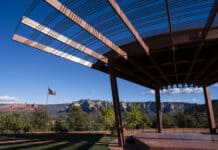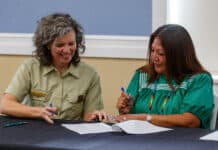
Barring rain, the Sedona Police Department is hosting its annual National Night Out on Saturday, Oct. 6.
The public is encouraged to come out and meet the city’s officers, see law enforcement, firefighting and rescue equipment and witness training demonstrations. The K-9 demonstration of removing a “suspect” from a car is always a highlight.
The National Night Out event in Cottonwood — canceled on Tuesday due to the heavy rain from Tropical Storm Rosa — usually features a rookie officer who “volunteers” to be tased to show residents how the device can quickly subdue a suspect.
The event embodies small-town life and community policing. Unlike major cities wherein the police and some residents have a systemic adversarial relationship, the Sedona Police Department is a small-town agency that focuses on community policing and, by and large, has a great relationship with both residents and visitors.
Community policing is a law enforcement philosophy that encourages police agencies to actively develop solutions to public safety problems and the fear of crime, rather than responding to crime only after it occurs. Officers in such agencies don’t approach every incident solely as a uniformed agent of the state enforcing the law, but also as neighbors trying to solve problems.
This difference in this philosophy became most clear to me in July 2016.
Slam poet Christopher Johnson, a longtime friend of mine from Providence, R.I., was a guest at the Sedona Art Center’s inaugural Sedona Summer Colony at Verde Valley School. Johnson brought some friends to my house in West Sedona. When leaving, the driver backed his rental car into a planter, tearing the bumper off the car and had to call to obtain a police report number for his insurance.
SPD Officer Jonathan Reed arrived at the scene and after concluding the call, Johnson and Reed spoke briefly about the recent shootings by police of black men, the Black Lives Matter movement and a recent guest perspective Johnson had written for our newspaper about his views as a black artist witnessing these national issues from the relative quiet of rural Northern Arizona.
By and large, Reed and Johnson had the same views, which is part of the community police effort used in Sedona and communities around the country. Police are supposed to resolve disputes before they escalate — or at least separate parties peacefully until they can resolve their disputes in court — enforce laws to protect public safety, investigate crimes to protect victims and the owners of private property and make sure civil society can function without fear. Without the law, there can be no freedom, and without justice, there can be no law.
After their chat, Reed and Johnson then posed for a selfie in my driveway, which we sent to then-interim Police Chief Ron Wheeler.
As journalists, police serve to provide us with information about crime and accidents so we can inform readers and residents about what’s happening in the community. We wish police would tell us more about ongoing investigations and police wish we wouldn’t ask so many questions while they’re still in the middle of determining what happened, but that’s the nature of news. In the end, we are on the same side: Police want peace for their neighbors and we want to tell residents how they’re providing it, as well as what precipitated the incident they had to respond to.
Fortunately, Sedona’s police officers generally provide us with information quickly on scene and the department’s leadership responds to phone calls and text messages, providing our staff with details regarding car accidents, rescues and police incidents so that our stories and photo captions can best inform readers about what incidents have happened around the city.
National Night Out will be held at Posse Grounds Park from 3 to 5:30 p.m., on Saturday, Oct. 6. Enjoy free hot dogs, burgers and meet the officers and first responders who keep Sedona safe.
Christopher Fox Graham
Managing Editor


















